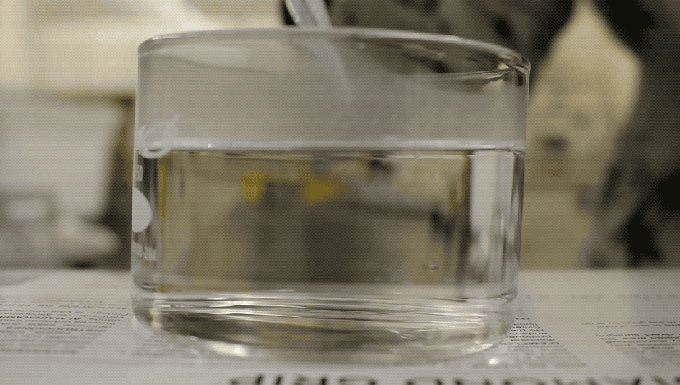“Reverse chocolate” — that’s how AesculaTech co-founder and chief science officer Niki Bayat describes the material created by its proprietary technology. Chocolate is solid until heated, when it melts deliciously into liquid. AesculaTech’s material, on the other hand, is a liquid at low temperatures, turns into a gel when heated and then reaches its final, solid state at body temperature. (If you are having a hard time visualizing the process or distracted by thoughts of dessert, there’s a gif below that shows it being injected into a 37 degree Celsius water bath).

By changing the composition of the material, AesculaTech is able to control the temperature at which it transitions into different states. While the liquid is transforming into a gel, different compounds, including medications, can be added to it. Bayat and co-founder Andrew Bartynski, who are in Y Combinator’s latest startup batch, say it has a wide range of potential applications, including pharmaceuticals, medical devices, cosmetics and textiles.
First, the material is being used in a treatment for dry eye syndrome. AesculaTech’s founders say the condition affects more than 20 million people in America, who collectively spend $3.5 billion a year treating symptoms that can include a burning, scratchy sensation, discharge and impaired vision. Prescription treatments like Restasis and Xiidra can take weeks or even months to reach full effectiveness, while over-the-counter eye drops bring only minutes of relief and need to be reapplied constantly. AesculaTech’s treatment, however, is designed to be administered by a doctor during a quick, in-office procedure and last for about a year. It is slated to be commercially available by 2019.
Bayat and Bartynski, AesculaTech’s chief executive officer, met in 2012 while doing graduate work in chemical engineering at the University of Southern California and discovered a shared interest in unique classes of materials. As graduation drew closer, they began to think of what they wanted to do next.
“One day I was talking to my dad and I heard from him that he’d been diagnosed with glaucoma, but because he’d had heart surgery, he couldn’t have another one,” says Bayat. “I kept thinking there should be a better way to treat glaucoma and so I started working on this project with Andrew and a few other people.”
The team decided to focus on dry eye syndrome first because it is easier to treat, but they plan to work on glaucoma medication in the future. The treatment starts off as an injectable liquid that is inserted into the patient’s tear duct by a doctor. It turns into a solid after raising to body temperature, forming a tiny plug that keeps tears from draining away from the surface of the eye.
AesculaTech has already performed pre-clinical animal trials that show its dry eye treatment creates statistically significant increases in tears on eyes and are preparing for human trials to bring it closer to approval from the Food and Drug Administration.
Because it only needs to be applied once a year, the treatment addresses another important health issue: medication compliance. Many patients don’t stick to drug regimens for chronic conditions as directed by their physicians even though it reduces the efficacy of their medicines. In the case of antibiotics, patient non-compliance can also impact public health by increasing bacterial resistance. As it branches out beyond ophthalmic treatments, Bayat and Bartynski hope their technology will form the foundation of a new way of taking medication that is more realistic for patients to follow.
“To allow people to get the treatment they need without having to interact with medication on a daily basis is hugely valuable because you deliver the treatment to them continuously so they don’t have to interrupt their daily life or be bound to an eye drop or pill pack,” says Bartynski.
“It’s not only about the treatment of dry eye or glaucoma,” adds Bayat. “We are thinking of a platform for drug delivery technology.”
AesculaTech’s founders say the technology can also be used to create materials for a wide range of products, like cosmetics and smart textiles that are temperature responsive. The startup’s plan is to form partnerships with companies, license their technology and help them bring new products to market. The material hasn’t been tested for food products yet, but Bayat and Bartynski say they haven’t seen any indications that it isn’t edible, so reverse chocolate may one day be more than just a simile.
from Startups – TechCrunch http://ift.tt/2HM36C4
via IFTTT
No comments:
Post a Comment
Thank You for your Participation